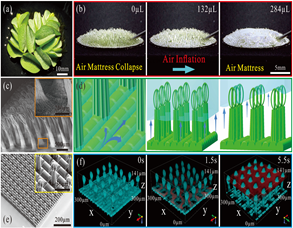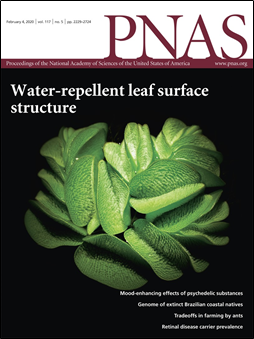Duan Huiling’s group makes progress on biomimetic mechanics of underwater solid-liquid-gas interface
Feb 17, 2020
Peking University, Feb. 17, 2020: The liquid-gas interface trapped on underwater solid structures has multiple excellent properties, such as drag reduction, anti-biofouling, and anti-corrosion, and that is why it has a promising potential for application in many industrial fields (e.g. shipping, pipeline transportation, and chemical industry). In nature, many aquatic animals and plants attach liquid-gas interface on their surface microstructures, which can support their underwater respiration and photosynthesis. It is of great scientific and engineering value to learn from the nature aquatic lives and draw inspiration from them to design and manufacture the biomimetic underwater solid-liquid-gas interfaces.
Duan Huiling’s group from College of Engineering, Peking University, found that the unique structures on the leaf surface of the floating fern, Salvinia molesta (Fig 1a), could keep the underwater liquid-gas interfaces in a super stable state (Fig 1b). Through bionics and stablity analysis, they revealed the design principle of the surface structures on Salvinia leaf (Fig 1c) and the physical mechanism to keep the liquid-gas interface stabe (Fig 1d). Following the natural design principle, they fabricated biomimetic artificial Salvinia surfaces by using 3D printing technology (Fig 1e), whereby the super stable function of liquid-gas interfaces has been successfully achieved (Fig 1f). This work was published in Proceedings of the National Academy of Sciences of the United States of America on February 4, 2020, entitled “Superrepellency of underwater hierarchical structures on Salvinia leaf” (https://www.pnas.org/content/117/5/2282?iss=5). Moreover, it was selected as the Cover of PNAS Issue 5, 2020 (Fig. 2, https://www.pnas.org/content/117/5.cover-expansion).
Figure 1. (a), (b) Nature Salvinia molesta and the liquid-gas interface on its leaf surface. (c), (d) Unique structures on the Salvinia leaf surface and schematics of the stable liquid-gas interface. (e), (f) The biomimetic artificial Salvinia surface and the liquid-gas interface on its surface.
The underwater liquid-gas interface tends to be unstable or even destroyed under the influence of various factors including liquid pressure, fluid flow, and air diffusion, which seriously limits its engineering application. Therefore, it is important to study the stability mechanism of liquid-gas interface and find the way to keep underwater liquid-gas interface stable in extreme environmental conditions. By analyzing the stability mechanism of liquid-gas interface on the Salvinia leaf, Duan Huiling’s group found a new strategy to accomplish this task. The strong stability of the liquid-gas interface attributes to the ingenious design of the structures on the Salvinia leaf (Fig 1c). Inspired by the structures on nature Salvinia leaf, the biomimetic artificial Salvinia surfaces were fabricated using 3D printing technology (Fig 1e), which will benefit the design principles of solid-liquid-gas interfaces and expand their underwater applications, especially in extreme environments.
Figure 2. The Cover of PNAS Issue 5, 2020
Duan Huiling’s group has been devoted to the study of underwater solid-liquid-gas interface mechanics for many years, and has a series of important results (including Extreme Mech. Lett. 27, 34, 2019; Phys. Rev. Lett. 119, 134501, 2017; Phys. Fluids 29, 032001, 2017; Phys. Rev. Lett. 112, 196101, 2014). Besides, their invitation review article about the underwater solid-liquid-gas interface mechanics published in the prestigious Review Journal (Appl. Mech. Rev. 68, 030803, 2016) received “The Lloyd Hamilton Donnell Applied Mechanics Reviews Paper Award (2016)”.
Dr. Xiang Yaolei is the first author of this work. Professor Duan Huiling is the corresponding author. This work was financially supported by National Natural Science Foundation of China.
Edited by: Huang Weijian
Source: College of Engineering, Peking University

